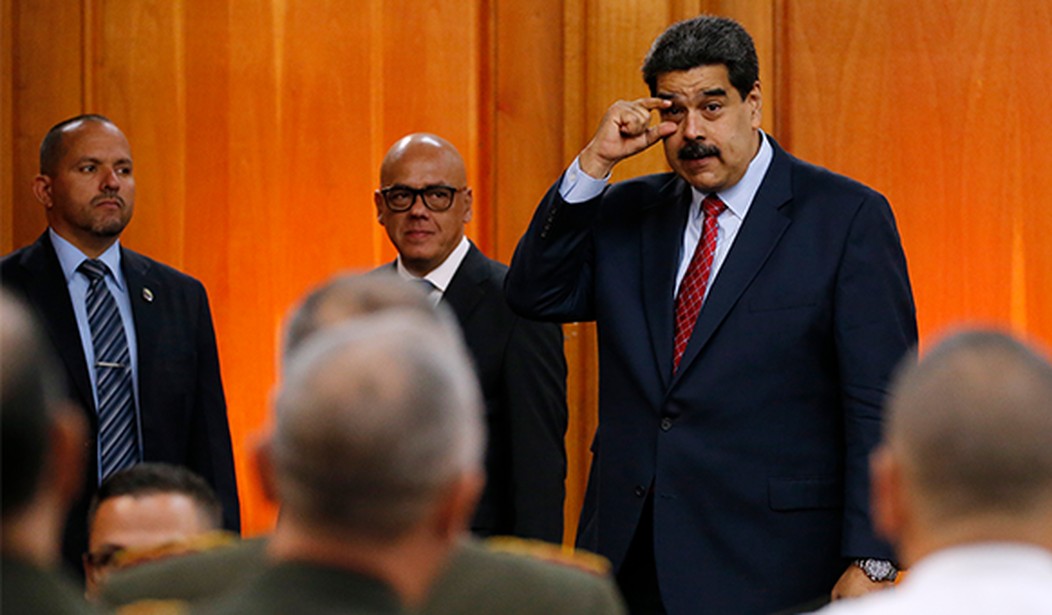As we’ve reported, Venezuelan president Nicolás Maduro declared he won the presidential election in July despite mountains of evidence that he actually received fewer votes than opposition candidate Edmundo González Urrutia. Now, according to the Wall Street Journal, the Biden administration is offering Maduro and his top henchmen amnesty and an end to the DOJ’s investigations into their dealings if he will give up power before his term ends in January.
The U.S. is pursuing a long-shot bid to push Venezuelan President Nicolás Maduro to give up power in exchange for amnesty as overwhelming evidence emerges that the strongman lost last month’s election, people familiar with the matter said.
The U.S. has discussed pardons for Maduro and top lieutenants of his who face Justice Department indictments, said three people familiar with the Biden administration deliberation. One of the people said the U.S. has put “everything on the table” to persuade Maduro to leave before his term ends in January.
Maduro has been all over the news lately:
United States to Venezuela's Maduro: You Actually Lost the Presidential Election
Venezuelan Dictator Maduro Curtly Rejects Safe Passage Offer From Panamanian President
Venezuela Strongman Maduro, Clinging to Power, Shuts Down X, Accuses Elon Musk of Launching 'Attack'
As our Ward Clark reported, the dictator has started a war of words with the social media platform X and its owner, Elon Musk. He has blocked the site after accusing them of undermining his regime:
Venezuela's strongman dictator Nicolás Maduro seems determined to stay in power, despite the cries of "fraud" that have surrounded that Latin American nation's election in July. Maduro is blocking social media outlets in a post-election crackdown, accusing X CEO Elon Musk of launching an "attack" against his reelection…
Musk hasn’t exactly been shy:
I’m coming for you Maduro! 🚀💣
— Elon Musk (@elonmusk) August 1, 2024
I will carry you to Gitmo on a donkey 🫏 https://t.co/RB5qltxsYI
The Journal reports, however, that the U.S. is offering amnesty to, as writer J Michael Waller described them, “some of the worst cartel figures in the hemisphere.”
Another person familiar with the talks said the U.S. would be open to providing guarantees not to pursue those regime figures for extradition. The U.S. in 2020 placed a $15 million bounty for information leading to Maduro’s arrest on charges of conspiring with his allies to flood the U.S. with cocaine.
The talks represent a flicker of hope for a Venezuelan political opposition that meticulously collected voter tallies showing its candidate, little-known former diplomat Edmundo González, defeated Maduro in a landslide in the July 28 election. Over the past two weeks, Maduro has jailed thousands of dissidents, maintained the military’s loyalty and tasked the Supreme Court, stacked with his handpicked allies, with resolving the election impasse, buying him time.
Maduro and his predecessor Hugo Chavez basically destroyed the once-prosperous South American country with their socialist policies. Communism and socialism seem to have the same track record everywhere they’re tried, yet even in this country, there are many who think, “It just hasn’t been done right yet.” But here’s the reality:
International action may be the only avenue to force out Maduro, who over 11 years of authoritarian rule has overseen an economic implosion, diplomatic isolation and the exodus of nearly eight million Venezuelans—more than war-torn Syria and Ukraine. Maduro has given transnational gangs a haven, U.S. and Colombian officials say, and allowed Russia, China and other U.S. rivals to gain a foothold in the Western Hemisphere.
Maduro’s grip on power is tenuous at the moment, but he’s survived plenty of political headwinds before. We’ll see if he can survive one more time—or if he takes the United States' Get Out of Jail Free card.














Join the conversation as a VIP Member